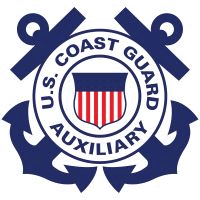-

ABOUT THE COAST GUARD AUXILIARY
The U.S. Coast Guard Auxiliary is the uniformed, all-volunteer component of the United States Coast Guard. The Auxiliary was created by an Act of Congress in 1939, and has grown to over 32,000 members who daily support the Coast Guard in all its non-military, and non-law-enforcement missions. We have members and units in all 50 states, Puerto Rico, the Virgin Islands, American Samoa, and Guam.
-
Auxiliary members conduct safety patrols on local waterways, assist in Search and Rescue, teach boating safety classes, conduct free vessel safety checks for the public, provide boating safety literature to dealers, as well as many other activities related to recreational boating safety.
The Coast Guard considers the Auxiliary its primary resource for recreational boating safety outreach and prevention, and each Coast Guard district around the nation has established a senior officer and staff to provide tight liaison and coordination between the active-duty Coast Guard and the various Auxiliary units in that district.
And in many inland portions of the country, where the majority of U.S. recreational boating occurs on lakes and rivers, the Auxiliary is the sole Coast Guard presence!
-
But the Auxiliary is more than recreational boating safety; we regularly serve alongside our active-duty shipmates serving as communications watchstanders, uninspected passenger vessel inspectors, training resources for air and sea operations, numerous duties related to environmental protection and homeland security, and even as chefs! In fact, there are nearly two dozen "qualifications" open to Auxiliarists willing to put in the time and training. Collectively, Auxiliarists volunteer over 4.5 million hours per year and complete nearly 500,000 missions – a true force multiplier for the Coast Guard!
-
Membership in the Auxiliary is open to persons 17 years of age and older. We are organized into 16 districts nationwide, comprised of 171 divisions with approximately 980 flotillas. No matter where you live, there is a flotilla near you. Find the unit nearest your Zip Code by clicking on "Units" at the top of this page. And for dozens of reasons why you should join, visit "Recruiting". You will not be sorry!
- PLEASE LEARN MORE ABOUT US BY EXPLORING OUR SITE. IT'S FOR EVERYONE!